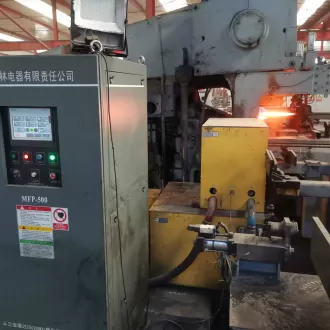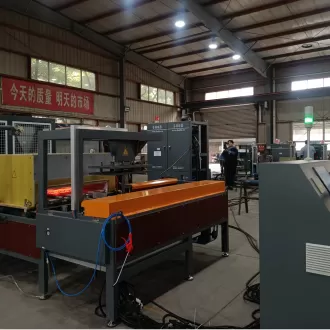+86 28 8393 0607
+86 28 8393 0607
Oct. 13, 2025
Induction heating and electric heating are two distinct methods of generating heat, each with unique characteristics and applications. Understanding their differences is crucial for selecting the right technology for specific industrial processes.
Electric heating works on the principle of resistive heating, where electrical energy is converted into heat through resistive elements. In this method, an electric current passes through a conductor, which resists the flow of electricity, causing it to heat up. Common examples include electric ovens, stovetops, and space heaters.
Key features of electric heating include:
Heat is generated by the resistance of the material to the electric current.
Efficiency is generally lower due to heat loss to the surrounding environment.
Temperature control is often basic, with simple on/off regulation.
Electric heating is suitable for applications where direct contact heating is acceptable and precise temperature control is not critical.
Induction heating uses electromagnetic fields to directly heat electrically conductive materials. An alternating current passes through a coil, creating a magnetic field that induces eddy currents within the workpiece, generating heat internally. This method is widely used in industrial applications requiring rapid, precise, and uniform heating.
Key features of induction heating include:
Heating occurs within the material itself, without direct contact.
Energy efficiency is high, with minimal heat loss.
Temperature, time, and heating location can be precisely controlled.
It is ideal for specialized industrial processes such as induction hardening, forging, brazing, and shrink fitting.

Duolin Electric Co., Ltd. specializes in advanced induction heating equipment designed for a variety of industrial applications (Induction Heating, Custom Induction Equipment, Induction Hardening)
Typical applications include:
Induction Hardening: Enhancing the surface hardness of components such as gears and shafts.
Induction Forging: Uniform heating for metal forming processes.
Brazing and Soldering: Precise joining of metal parts.
Shrink Fitting: Controlled expansion and contraction of components for assembly.
Duolin’s solutions improve production efficiency, reduce energy consumption, and ensure consistent, high-quality results in industrial processes.
While traditional electric heating remains widely used, induction heating offers superior efficiency, speed, and precision, making it ideal for specialized industrial applications. Understanding the differences between these heating methods allows manufacturers to choose the most suitable technology for their needs, optimizing performance and outcomes.
Latest News
1000KW Induction Heater for Hot Pipe Bending Installed in Negria
Jan. 15, 2026
Induction heating machine for pipe bending
Induction Billet Heater: Precision Heating for Modern Metalworking
Jan. 12, 2026
In the fast-paced world of metal processing, precision, efficiency, and reliability are key. Induction billet heaters have emerged as a vital solution for preheating metal billets before forging, extrusion, or rolling.
Case Presentation
Customized Turnkey induction heating machine
Provide solution according to your requirement, well match with your production line
Related Products
Reform the Manual Production Line to Automatic
Under background of industry 4.0 and customer new request for saving the labor,full and semi-automatic production become the new trends in manufacturing industry.
Solid Sucker Rod Long Bar Two Ends Induction Hot Forge
Sucker rod used to transmit ground power to the oil pump when useing a rod pump to pump oil in oil industry. They are generally solid steel poles made of carbon steel or alloy steel, each about 8 meter long and connected with special couplings. Specially made hollow steel pipes are also used to pump oil which are called hollow oil sucker rods.
Automatic Induction Brazing for Wear-resistant Plate
The pump truck spectacle plate is a plate that looks like glasses, also known as a wear-resistant plate. It is often used in concrete pumps in the industrial field.
In 2018, we received bid for BYD auto for induction pipe bending project, they want to expand their steel structure factory for hot pipe&tube bender industry, to get new increasing profit because the order for auto industry decrease recent year.
DUOLIN Induction hardening is the most common form of induction heat treatment. It is widely used on shaft, gear, pipe .pin and other part in automotive industry.
Vehicle Parts Connection Rod Hot Forging
Induction hot forging is the most common heating application for induction heating,end hot forging for fasteners manufacture,complete billet heating for hot stamping in vehicle parts industry etc
Bearing is an important component in modern mechanical equipment. Its main function is to support the mechanical rotating body, reduce the friction coefficient during its movement, and ensure its rotation accuracy. Used in Metallurgy, wind power, mining machinery, aerospace, automotive parts industry.
Chain Hardening and Tempering Machine
Chains are generally metal links or rings, which are mostly used for mechanical transmission and traction, and are used in all industries that use chain transmission.
Induction heating is the process of heating an electrically conducting object (usually a metal) by electromagnetic induction, through heat generated in the object by eddy currents. An induction heater consists of induction power supply (induction heater) and inductor (coil) that is a shaped to contour the part, and a work station where the part is held and presented to the coil.
Quick Links
Tel.: +86 28 8393 0607
Mob.: +86 158 8242 2821
WhatsApp: +86 158 8242 2821
Add.: 112th Hancheng Road Xindu Industrial Zone Chengdu China









